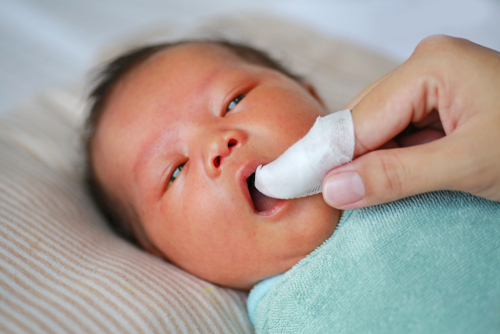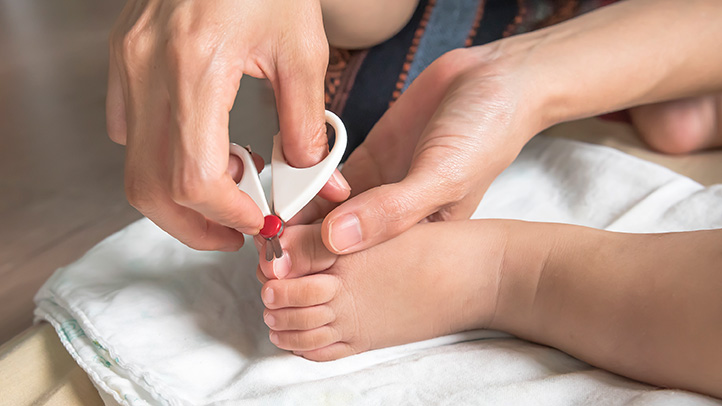Use a soft-bristled baby toothbrush and fluoride-free toothpaste for baby oral care. Clean gums with a damp cloth after feeding.
Caring for a baby’s oral health is crucial from the start. Healthy habits ensure strong teeth and prevent future dental issues. Begin by wiping the gums with a clean, damp cloth after each feeding. This routine helps remove milk residue and bacteria.
Once the first tooth appears, switch to a soft-bristled baby toothbrush. Use fluoride-free toothpaste to avoid ingestion risks. Establishing these practices early sets the foundation for lifelong oral health. Regular visits to a pediatric dentist are also recommended. Proper oral care can prevent cavities and promote a healthy smile. Always prioritize gentle and consistent cleaning for your baby’s developing teeth and gums.

Credit: www.amazon.com
Introduction To Baby Oral Care
Caring for your baby’s mouth is very important. Healthy baby teeth lead to a healthy smile. Good oral care starts from birth. Early dental habits set the stage for lifelong oral health.
Importance Of Early Dental Hygiene
Early dental hygiene is essential for your baby. It helps prevent tooth decay and gum diseases. Clean gums before the first tooth appears. Use a soft, damp cloth to wipe gums. Once teeth appear, use a baby toothbrush.
Here are some key benefits of early dental hygiene:
- Prevents tooth decay: Keeps baby teeth healthy.
- Promotes good habits: Teaches your baby to care for their teeth.
- Supports overall health: Reduces risk of infections and diseases.
Common Oral Issues In Infants
Infants can face several oral issues. Recognizing these issues early is key.
| Issue | Symptoms | Prevention |
|---|---|---|
| Teething | Swollen gums, drooling, irritability | Use teething rings, cold washcloths |
| Baby Bottle Tooth Decay | Brown spots on teeth, pain | Avoid sugary drinks, clean teeth daily |
| Thrush | White patches in the mouth | Maintain oral hygiene, consult a doctor |
Understanding these issues helps in timely intervention. Always keep your baby’s mouth clean and healthy.
Choosing The Right Toothbrush
Keeping your baby’s oral health in check starts with the right toothbrush. Selecting the right one can make a big difference. It ensures your baby’s gums and teeth stay clean and healthy. Below, find out what type of toothbrushes are best and when to start using them.
Types Of Baby Toothbrushes
There are several types of baby toothbrushes. Let’s explore them:
| Type | Description |
|---|---|
| Finger Toothbrush | A brush that fits on your finger. It has soft bristles. |
| Training Toothbrush | Has a small head with soft bristles. It often comes with a guard. |
| Electric Toothbrush | Battery-operated with a small, soft-bristled head. Suitable for older babies. |
| Silicone Toothbrush | Made entirely of silicone. It’s soft and gentle on gums. |
When To Start Using A Toothbrush
Knowing when to start brushing your baby’s teeth is important. Here are some guidelines:
- Before Teeth Erupt: Use a soft, damp cloth to clean gums.
- First Tooth: Begin using a finger toothbrush or training toothbrush.
- Around Age One: Transition to a small, soft-bristled toothbrush.
- Age Two: Consider an electric toothbrush if your child is comfortable with it.
Starting oral care early helps prevent tooth decay. It also sets good habits for life.
Selecting Safe Toothpaste
Selecting Safe Toothpaste for your baby is crucial. Baby teeth require special care. You need to choose products that are safe. Let’s explore two main considerations.
Fluoride Vs. Non-fluoride
Fluoride toothpaste helps in preventing cavities. It strengthens the enamel. But too much fluoride can cause fluorosis. Fluorosis stains the teeth.
For babies under two, consider non-fluoride toothpaste. It reduces the risk of fluorosis. Check with your pediatrician for advice. They can help decide the best option.
Natural Toothpaste Options
Many parents prefer natural toothpaste for their babies. These products often avoid harsh chemicals. They use ingredients like xylitol and aloe vera.
Look for toothpaste that is free from artificial colors and flavors. Ensure it is safe to swallow. Some popular natural brands include:
- Tom’s of Maine
- Jack N’ Jill
- Dr. Bronner’s
Always read labels carefully. Make sure the toothpaste is designed for babies.
| Feature | Fluoride Toothpaste | Non-Fluoride Toothpaste | Natural Toothpaste |
|---|---|---|---|
| Prevents Cavities | Yes | No | Depends on ingredients |
| Safe to Swallow | No | Yes | Yes |
| Free from Harsh Chemicals | No | Yes | Yes |
Teething Relief Solutions
Teething can be a challenging phase for both babies and parents. Babies experience discomfort, pain, and irritability during teething. Finding effective teething relief solutions can help soothe your baby and make this period more manageable.
Teething Rings And Gels
Teething rings and gels are popular choices for teething relief. Teething rings are chewable toys that help massage a baby’s gums, providing comfort. They come in various shapes, sizes, and materials. Some can be chilled in the refrigerator for added relief.
- Choose BPA-free teething rings.
- Wash them regularly to maintain hygiene.
- Avoid freezing teething rings as they can become too hard.
Teething gels contain mild anesthetics to numb the gums. They provide quick relief from teething pain. Always consult your pediatrician before using teething gels.
| Product Type | Benefits | Considerations |
|---|---|---|
| Teething Rings | Massages gums, easy to hold | Ensure they are BPA-free |
| Teething Gels | Quick pain relief | Consult a doctor before use |
Home Remedies For Teething Pain
Many parents prefer home remedies for teething pain as natural options. They can be safe and effective. Here are some simple home remedies:
- Cold Washcloth: Wet a clean washcloth and chill it in the refrigerator. Let your baby chew on it for soothing relief.
- Chamomile Tea: Dip a washcloth in chamomile tea and chill it. Chamomile has natural soothing properties.
- Cold Foods: Offer chilled foods like yogurt or pureed fruits if your baby is eating solids. This can help numb the gums.
These home remedies can provide comfort without chemicals. Always supervise your baby to ensure safety.
Daily Oral Care Routine
Ensuring your baby’s oral health starts with a consistent daily oral care routine. Early oral hygiene helps prevent cavities and promotes healthy gums.
Brushing Techniques For Babies
Use a soft-bristled toothbrush designed for babies. Begin by gently brushing your baby’s gums and teeth. Angle the brush at 45 degrees to the gum line. Use small, circular motions to clean each tooth.
If your baby is too young for a toothbrush, use a clean, damp cloth. Wrap it around your finger and gently wipe the gums. This helps remove bacteria and food particles.
Frequency And Duration
Brush your baby’s teeth twice a day. Once in the morning and once before bed.
Each brushing session should last about two minutes. For babies, keep the session short and gentle. This ensures a thorough clean without discomfort.
Check the table below for a quick reference:
| Age | Brushing Frequency | Duration |
|---|---|---|
| 0-12 months | Twice daily | 1-2 minutes |
| 12-24 months | Twice daily | 2 minutes |

Credit: newdentistblog.ada.org
Diet And Oral Health
Good diet choices are vital for your baby’s oral health. What your baby eats can affect their teeth. Some foods can harm teeth, while others help keep them strong.
Impact Of Sugary Foods
Sugary foods can cause tooth decay. Bacteria in the mouth love sugar. They turn sugar into acid. Acid attacks the teeth. This can lead to cavities.
Common sugary foods include:
- Candy
- Soda
- Cookies
- Juice with added sugar
Limit these foods to protect your baby’s teeth. Choose healthier options instead.
Healthy Snacks For Strong Teeth
Some snacks can help keep teeth strong. Choose snacks low in sugar. These snacks also provide important nutrients.
Here are some healthy snack ideas:
| Snack | Benefit |
|---|---|
| Cheese | Rich in calcium, strengthens teeth |
| Yogurt | Contains probiotics, good for gum health |
| Carrot sticks | Crunchy, helps clean teeth |
| Apple slices | High in fiber, good for gums |
| Nuts | Rich in minerals, good for teeth |
Offer these snacks to your baby. They help in keeping teeth healthy.
Avoid sticky and sugary snacks. These can stay on teeth and cause harm.
First Dental Visit
Ensuring your baby’s oral health is crucial. The first dental visit marks a significant milestone in their journey. This initial appointment helps set the stage for a lifetime of healthy smiles.
When To Schedule
Many parents wonder about the right time for their baby’s first dental visit. According to experts, you should schedule the visit by your child’s first birthday. Alternatively, plan it within six months after their first tooth emerges.
Here’s a quick guide:
- First Tooth: Schedule within six months.
- First Birthday: Ensure the visit happens by this time.
What To Expect
Knowing what to expect can ease any anxiety about the visit. The first dental visit usually involves a few simple steps:
- The dentist will examine your baby’s mouth.
- They will check for any signs of decay.
- The dentist may clean your baby’s teeth gently.
- You’ll receive tips on baby oral care.
The dentist will also discuss:
- Teething: How to soothe teething pain.
- Diet: Foods and drinks that are good for teeth.
- Oral Hygiene: Proper brushing techniques for babies.
Remember, this visit is a learning experience for both you and your baby. It’s also a chance to establish a positive relationship with the dentist, making future visits more comfortable.

Credit: newborn-health-standards.org
Preventing Cavities
Protecting your baby’s teeth from cavities is essential. This ensures a healthy smile and good oral health. Cavities can cause pain and other dental issues. Here are some effective methods to prevent cavities in your baby’s teeth.
Proper Cleaning Practices
Cleaning your baby’s teeth is crucial. Use a soft-bristled toothbrush. You can start cleaning once the first tooth appears. Use a tiny amount of fluoride toothpaste. Brush twice a day, in the morning and before bed.
- Gently brush the teeth and gums.
- Use a small, circular motion.
- Avoid using too much toothpaste.
For babies without teeth, clean their gums. Use a clean, damp cloth. Wipe the gums gently after feeding. This removes any leftover milk or food particles.
Importance Of Regular Check-ups
Regular dental check-ups are important. Schedule the first dental visit by the baby’s first birthday. Early visits help detect any potential issues. Regular check-ups also help in educating parents about proper oral care.
- Visit the dentist every six months.
- Ask the dentist about fluoride treatments.
- Discuss any concerns with the dentist.
These visits build a dental routine for your child. It also helps them become comfortable with the dentist. Early prevention is key to avoiding cavities.
Frequently Asked Questions
What Can I Use For My Baby’s Mouth?
Use a soft, damp cloth to clean your baby’s mouth. For teething, a clean teether or chilled washcloth helps.
What Should I Use To Clean My Baby’s Teeth?
Use a soft-bristled, baby toothbrush with a small head. Use a tiny amount of fluoride toothpaste. Clean gently twice daily.
When Should You Start Cleaning A Baby’s Mouth?
Start cleaning a baby’s mouth from birth. Use a soft, damp cloth to wipe gums after feedings. This helps prevent bacteria buildup.
What Do You Brush Newborn Gums With?
Use a clean, damp gauze or soft cloth to gently wipe your newborn’s gums daily.
Conclusion
Choosing the right oral care products for your baby is crucial. Focus on safe, effective, and pediatrician-approved options. Establishing good oral hygiene habits early ensures a healthy smile for years to come. Regular check-ups with a pediatric dentist are also essential.
Prioritize your baby’s oral health for their overall well-being.

